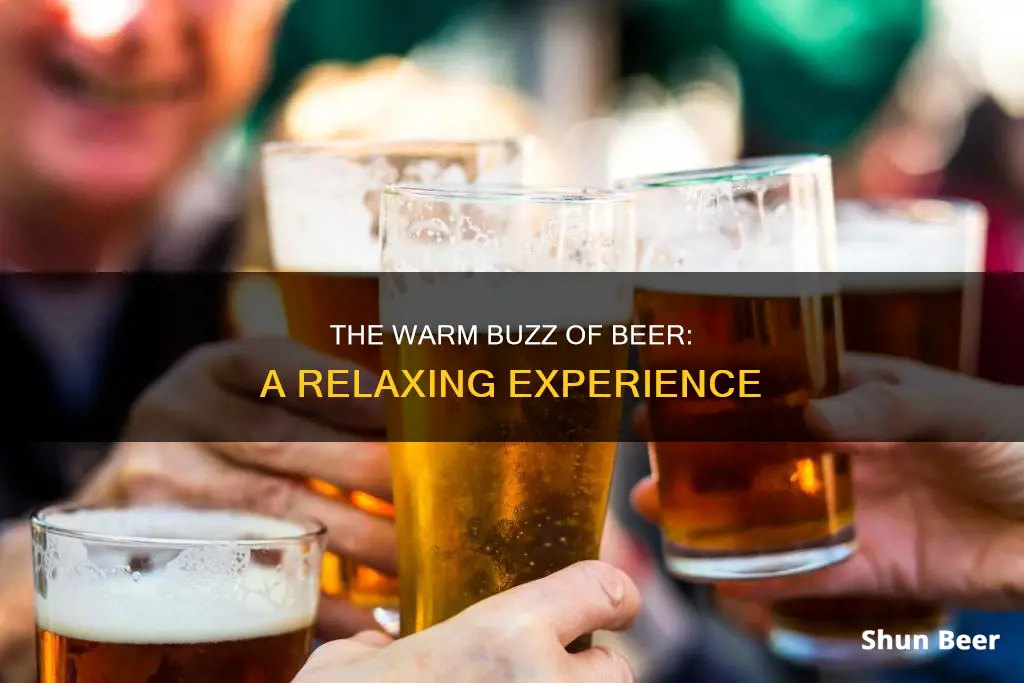
Drinking beer, or any alcoholic beverage, can lead to a variety of feelings and effects on the body. Alcohol quickly enters the bloodstream and travels to the brain, kidneys, lungs, and liver. The effects of alcohol depend on various factors, such as age, gender, weight, and the type of alcohol consumed. While drinking, individuals may experience feelings of relaxation and euphoria, but these sensations can be followed by negative consequences, including hangovers, which encompass symptoms like fatigue, weakness, nausea, and increased blood pressure. Understanding the impacts of alcohol consumption is essential for making informed decisions about drinking behavior.
What You'll Learn

A beer can make you feel happy and less inhibited
Alcohol can have a range of effects on people, and beer, as an alcoholic drink, is no exception. Beer can make you feel happy and less inhibited, but it's important to remember that the effects of alcohol can vary depending on factors such as age, gender, weight, and whether you've eaten before drinking.
When you drink beer, the alcohol enters your bloodstream and quickly travels to your brain, kidneys, lungs, and liver. The alcohol in beer can stimulate your appetite and increase the flow of stomach juices, which is why you may feel hungry after a drink. The effect of a beer can be pleasant, leaving you feeling relaxed, calm, and even euphoric. Beer, like other alcoholic drinks, can also make you feel less inhibited and more sociable.
However, it's important to remember that drinking too much beer can lead to negative consequences, such as a hangover. A hangover is your body's way of telling you that you've had too much alcohol, and it can include symptoms like fatigue, weakness, thirst, headache, nausea, and increased blood pressure. The severity of a hangover can vary from person to person and depends on the amount of alcohol consumed.
The effects of beer can also be influenced by factors such as age and gender. For example, older people who continue to drink the same amount of alcohol as they did when they were younger may experience more severe effects due to the changes in their body composition. Women also tend to feel the effects of alcohol more quickly than men since their bodies have a higher fat percentage and lower water percentage, resulting in a higher concentration of alcohol in their blood.
Additionally, drinking on an empty stomach can cause the alcohol to be absorbed directly into the bloodstream, leading to more immediate and intense effects. On the other hand, drinking beer with food can slow down the absorption of alcohol, potentially resulting in a milder and more gradual experience.
Beer and Balding: Is There a Link?
You may want to see also

You may feel more aggressive after drinking a beer
Alcohol can make people feel more aggressive for several reasons. Firstly, it reduces inhibitions and impairs cognitive functioning, making it harder to control impulses and think straight. This means that when drunk, people may find it more difficult to resist the urge to act on their anger. The prefrontal cortex, which is involved in decision-making and self-control, is affected by alcohol, further contributing to impulsive behaviour.
Additionally, alcohol can narrow people's attention, causing them to miss social and environmental cues that help interpret situations rationally. This is known as "alcohol myopia". It can lead to people becoming angry or violent, even in situations they would normally shrug off. Alcohol also affects how people process information, making them more likely to misinterpret others' behaviour and overreact to minor incidents, such as someone accidentally bumping into them.
Drinking alcohol can also reduce feelings of empathy, making it harder for people to see things from another person's perspective. This reduced empathy, combined with lowered inhibitions, can result in angry outbursts and aggressive behaviour. Binge drinking increases the likelihood of aggression, and men are more prone to it than women.
Finally, alcohol affects different people in different ways. Those who struggle with anger management issues when sober are more likely to become aggressive when drinking. This can make them unpredictable and unsafe, as even minor issues can trigger their temper.
Understanding Beer: Standard Drinks in a Pint
You may want to see also

Beer can cause dehydration and a hangover
Drinking beer, or any alcoholic beverage, can lead to a hangover, which is a set of unpleasant physical and mental symptoms. Hangovers are very common in people who consume too much alcohol, with about 75% of people who drank excessively the previous night reporting hangover symptoms.
Hangover symptoms include dehydration, fatigue, weakness, thirst, headache, muscle aches, nausea, stomach pain, vertigo, sensitivity to light and sound, anxiety, irritability, sweating, and increased blood pressure. These symptoms can last about a day or possibly longer, and there is no quick cure. The only surefire remedy for a hangover is to avoid drinking excessively or to choose not to drink at all.
Alcohol is a diuretic, which means it causes you to urinate more, resulting in the loss of a lot of fluids. This leads to dehydration, which is one of the main causes of hangovers. Alcohol also reduces the release of the hormone vasopressin, which helps to balance the body's fluids. Dehydration caused by alcohol consumption can contribute to hangover symptoms such as thirst, fatigue, and headaches.
In addition to dehydration, drinking beer can also disrupt your sleep, irritate your gastrointestinal system, increase inflammation in the body, and affect your nervous system. These factors can all contribute to the unpleasant symptoms of a hangover.
To prevent or reduce the severity of a hangover, it is recommended to drink in moderation, alternate alcoholic beverages with water, and eat before and while drinking.
Beer Overload: Swollen Taste Buds?
You may want to see also

Drinking beer on an empty stomach can be dangerous
Drinking beer, or any alcoholic beverage, on an empty stomach can be dangerous. Alcohol is absorbed into the bloodstream primarily via the small intestine, and having food in your stomach before drinking slows down this absorption process. When you drink on an empty stomach, the alcohol passes quickly from the stomach into the small intestine, where most of it is absorbed into the bloodstream. This intensifies all the side effects of drinking, such as difficulty with thinking and coordination.
Binge drinking on an empty stomach is particularly dangerous, as it can lead to a rapid rise in blood alcohol levels, increasing the toxic effects of alcohol on the brain. This can cause serious harm, leading to injury or even death in extreme cases. Additionally, drinking on an empty stomach can irritate the lining of the stomach when combined with stomach acid, which can worsen when the stomach is empty.
In rare cases, significant alcohol consumption on an empty stomach can trigger a serious complication called alcoholic ketoacidosis. This condition disrupts the body's metabolism and can lead to severe nausea, vomiting, and abdominal pain. It requires hospital treatment and can even be fatal.
To avoid the dangers of drinking on an empty stomach, it is important to eat before consuming alcohol. Eating food with carbohydrates, such as bread, cereals, grains, or rice, can help slow down the absorption of alcohol and reduce the risk of negative side effects. It is also important to drink water and replenish electrolytes to stay hydrated, as alcohol can cause dehydration.
Light to moderate drinking on an empty stomach may not be a major cause for concern. However, it is always better to be safe and consume alcohol responsibly, ensuring that you have eaten beforehand and staying within the recommended guidelines for alcohol consumption.
Hines Park, Michigan: Beer Drinking Allowed?
You may want to see also

Beer can cause an increase in body temperature
Drinking beer, or any alcoholic beverage, can cause you to feel a range of emotions and physical sensations. Alcohol travels quickly from your stomach to your bloodstream and spreads throughout your body, affecting your brain, kidneys, lungs, and liver. While beer doesn't directly increase your body temperature, it does disrupt your body's ability to regulate its core temperature.
Alcohol is a vasodilator, causing the blood vessels in your skin to dilate and redirecting blood flow from your core to your periphery. This redistribution of blood creates the sensation of warmth, often referred to as the "beer blanket" phenomenon. Your skin, inundated with sensory receptors, detects this change and sends signals to your brain indicating that your body is hot. As a result, you may start to sweat, a natural response to lower body temperature. However, this perceived increase in body heat can be misleading and even dangerous.
The illusion of warmth created by alcohol consumption can impair your ability to recognize cold environments and take appropriate measures to stay warm. This impairment, combined with the cognitive effects of alcohol, increases the risk of hypothermia. Alcohol disrupts the natural process of vasoconstriction, which normally occurs in lower temperatures to direct blood towards vital organs. By reversing this process, alcohol can make you more susceptible to frostbite and other cold-related injuries.
Additionally, the symptoms associated with a hangover, which can include a severe increase in body temperature, are often triggered by dehydration and low blood sugar. Alcohol consumption can also trigger an immune response similar to an infection, resulting in a fever. Therefore, while beer doesn't directly increase your body temperature, it interferes with your body's temperature regulation and can lead to a higher body temperature in certain circumstances.
Beer and Tooth Extraction: What's Safe to Drink?
You may want to see also
Frequently asked questions
Alcohol affects people differently, but you may initially feel happy and less inhibited after drinking beer. However, as you continue to drink, you may experience negative side effects such as losing your coordination, feeling down or aggressive, and increased warmth and redness in your face.
Drinking a small amount of alcohol stimulates your appetite because it increases the flow of stomach juices.
Drinking a large amount of alcohol can dull your appetite and cause malnutrition.
Beer can irritate the lining of your stomach and increase acid release, leading to nausea and stomach discomfort.
Alcohol is a diuretic, which means it increases urine production and causes dehydration.







